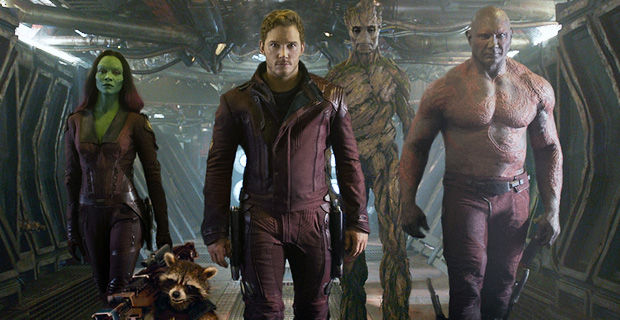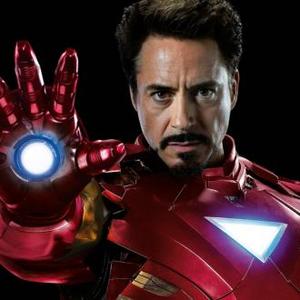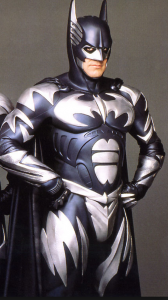 Here’s a surprise: Guardians of the Galaxy, the latest movie dispatch from the Marvel Universe, is great fun. Unlike such steroidal fare as “The Avengers” films, it doesn’t take itself too seriously, perhaps because it is directed by James Gunn, who is best known for micro-budget indies that send up genre flicks (Super, Slither). Certainly these Guardians are a ragtag group of mercenaries who don’t take anything too seriously: a wily human-raccoon hybrid voiced by Bradley Cooper; a tree-man voiced by Vin Diesel; a green-skinned female assassin (Zoe Saldana) who, unlike most comic book-pic women characters, actually has something to do; and a jacked-up Chris Pratt as a fortune-hunter with a predilection for “awesome music” mix tapes. Overall, despite its maelstrom of intra-extraterrestrial beefs and terminology, this is an unusually witty, even endearing, comic book movie, with serious visual wizardry and, yep, an awesome music soundtrack to sweeten the deal.
Here’s a surprise: Guardians of the Galaxy, the latest movie dispatch from the Marvel Universe, is great fun. Unlike such steroidal fare as “The Avengers” films, it doesn’t take itself too seriously, perhaps because it is directed by James Gunn, who is best known for micro-budget indies that send up genre flicks (Super, Slither). Certainly these Guardians are a ragtag group of mercenaries who don’t take anything too seriously: a wily human-raccoon hybrid voiced by Bradley Cooper; a tree-man voiced by Vin Diesel; a green-skinned female assassin (Zoe Saldana) who, unlike most comic book-pic women characters, actually has something to do; and a jacked-up Chris Pratt as a fortune-hunter with a predilection for “awesome music” mix tapes. Overall, despite its maelstrom of intra-extraterrestrial beefs and terminology, this is an unusually witty, even endearing, comic book movie, with serious visual wizardry and, yep, an awesome music soundtrack to sweeten the deal.
But we’ve got to ask: Why do actors of such caliber keep taking these roles? Pratt is an as-yet underrated Hollywood presence but rounding out the Guardians cast is a bevy of Oscar winners and nominees: Cooper, Glenn Close, John C. Reilly, Benicio del Toro, Djimon Hounsou. Sure, the paychecks from these gigs might be good enough to finance these actors’ great-great-great grandchildren’s college educations. But is money the only reason to take these gigs? Believe it or not, industry insiders say no. Here are some other factors for our consideration:
The Clout Factor. “These roles empower actors for future film roles in which they actually get to act,” says David Poland, editor-in-chief of Movie City News. “Some actors, like Cobie Smulders, have been on a TV show for a long time and need some big movie credentials.” He points out that, because of her role in The Avengers, Scarlett Johansson can “drive funding on as many Under The Skin-level films as she likes for the next five years.” The Avengers also “enabled Scarlett to star in Lucy, which then opened at number one,” says Anne Thompson, Thompson on Hollywood blogger and The $11 Billion Year author. “Stars do these roles to become bigger stars. Jennifer Lawrence did X-Men for that reason. Shia LaBeouf came out ahead, as did Mark Ruffalo. They make fuck-you money to pursue smaller, more serious projects.”
 New York Times and Rolling Stone movie journalist Logan Hill counters: “As we’ve seen with Marvel’s tight-fisted contracts, actors often don’t even get paid a lot of money to put on a superhero suit. They do get to raise their profile, though. A lot of them sign up for these franchises because it increases their so-called Q score, which, in turn, makes the rest of their career, from endorsement deals to prestige flicks, easier.”
New York Times and Rolling Stone movie journalist Logan Hill counters: “As we’ve seen with Marvel’s tight-fisted contracts, actors often don’t even get paid a lot of money to put on a superhero suit. They do get to raise their profile, though. A lot of them sign up for these franchises because it increases their so-called Q score, which, in turn, makes the rest of their career, from endorsement deals to prestige flicks, easier.”
The International Factor. “With today’s global box office, an actor’s international appeal – measured and polled, country by country – is essential,” says Hill. No matter how well-received, “Indies generally don’t play well abroad, with all that dialogue and all those specific references. But a domestic superhero flop like John Carter has lots of explosions and effects that don’t need subtitles, and so goes on to earn $211 million abroad.” He points out the case of an actor like Taylor Kitsch, who was embraced domestically because of the TV show Friday Night Lights but didn’t make a splash internationally until his X-Men and John Carter roles. “Even great actors can’t get medium-sized films green-lit without making an impression overseas these days,” Hill says.
Okay, but what about an actor like Robert Downey Jr., whose massive career comeback seems to consist only of comic-book movies?
The “It’s the Acting, Stupid” Factor. “Any way an actor can bond with an audience is desirable,” says David Edelstein, CBS News and New York Magazine critic. “It’s why most actors are actors, right? Plus, there are certain kinds of hyper-realistic roles – and roles of mythic stature – that actors love that they can only do in genre films. Tom Hiddleston would probably make a great Macbeth or Hamlet someday but in the meantime he can play the Machiavellian trickster Loki in The Avengers, and in the bargain help indie and stage directors get financing for all sorts of things, maybe even his Hamlet.”
Often comic book movie roles are meatier than we recognize, anyway. Don’t forget that Heath Ledger won a posthumous Oscar for his turn as The Joker in The Dark Knight. Veteran entertainment reporter Bill McCuddy says, “Nearly every comic book character has a dark side, and actors like that. And the real star of these comic book movies are the supervillains, not the superheroes. People like Gene Hackman can chew the Kryptonite off the scenery and steal every scene in the film.”
The Fan Factor. Lest we forget, stars are people, too, and, as McCuddy says, “Those in their thirties, forties, and especially their fifties probably grew up reading comic books.” Says Poland: “There are actors who are actually fans, like Samuel L. Jackson.” Not to mention actors may have an easier time establishing themselves as superheroes to their kids when they actually play superheroes.
The Fun Factor. Sure, George Clooney reportedly will never live down the humiliation of playing the Dark Avenger in the hypersexualized Batman & Robin. (“He still gets kidded for his Bat cod piece,” says McCuddy.) But while these roles sometime become a trap, Poland says, “More often than not, they’re a gift.” Chris Evans, that consummate comic book movie star (Captain America, Fantastic Four), has said in interviews, “Man, I love these characters. I get to be a superhero, which is fun. It kind of feels like summer camp.” Never underestimate the superpower of a good time.
This essay originally was published in Word and Film.
